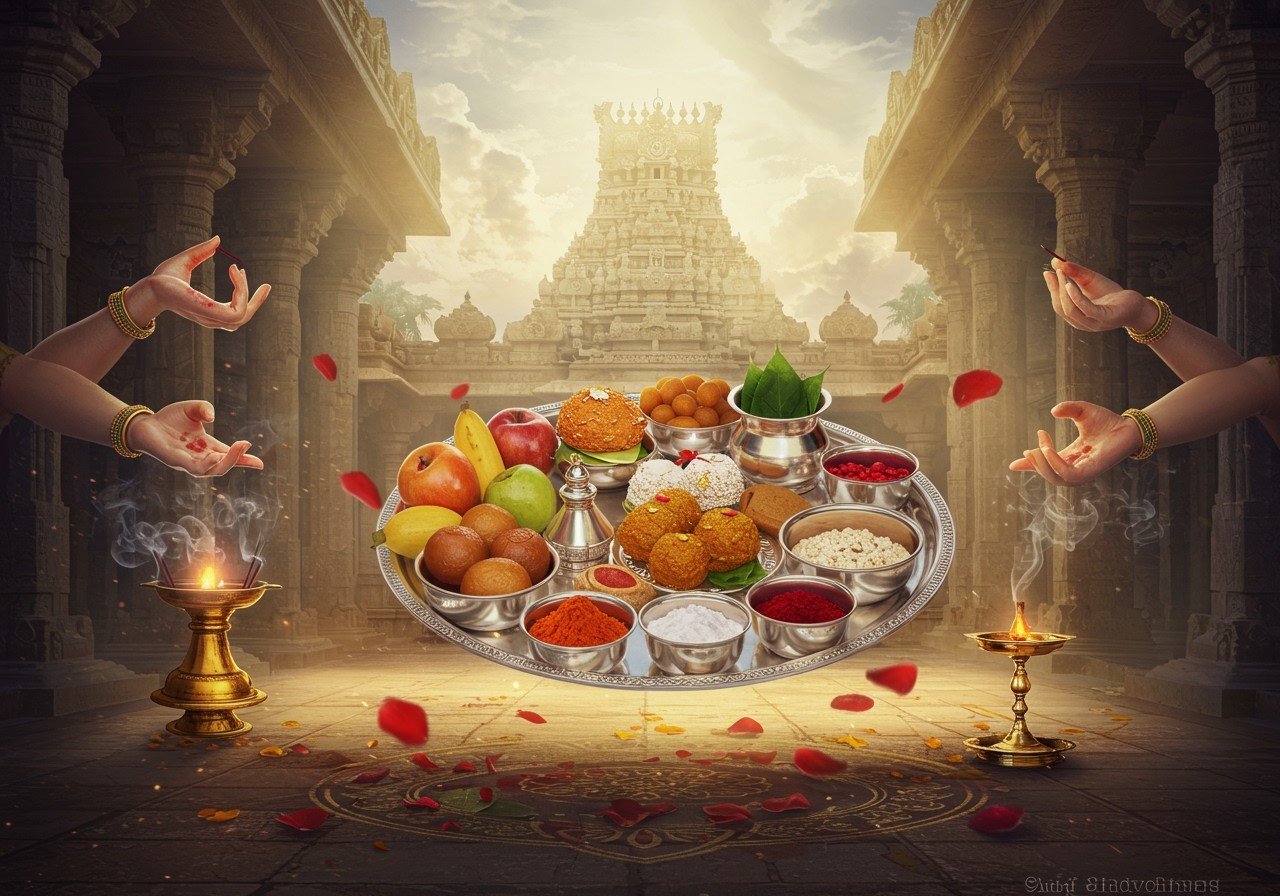
Prasada, a word echoing with reverence and devotion, holds a special place in Hindu culture. It’s more than just food; it’s a tangible symbol of divine grace, a connection between the human and the divine. This sacred offering, blessed by the deity, carries a profound spiritual significance that nourishes both body and soul. Let’s explore the beautiful tradition of prasada, its meaning, variations, and how you can easily incorporate it into your daily life.
Understanding the Essence of Prasada
Prasada, derived from the Sanskrit word meaning “grace” or “favor,” signifies a divine gift. It’s the food offered to a deity during puja, imbued with the deity’s blessings, and then shared among devotees. Imagine the fragrance of freshly prepared naivedya, the offering before it becomes prasada, filling the temple air—a sensory experience that evokes a feeling of divine presence. The act of offering and receiving prasada is a sacred exchange, fostering humility, gratitude, and a deeper connection with the divine. Consuming prasada is not just an act of eating; it’s an act of accepting divine blessings, purifying the mind and body.
This beautiful practice reminds us that the divine is present in the everyday, in the simple act of sharing a meal. The transformation of naivedya into prasada, through the deity’s touch, elevates it from ordinary food to a sacred offering.
The Significance of Prasada in Hindu Rituals
In Hinduism, prasada plays an integral part in both temple rituals and home worship. In grand temples, trained priests meticulously prepare naivedya, following age-old traditions, and offer it to the deities multiple times a day. This sacred food, once offered and blessed, becomes prasada, a symbol of divine grace shared among devotees. It’s a powerful reminder of the divine presence in our lives. Even in the simplicity of a home shrine, the offering of prasada, however humble, carries the same spiritual weight, connecting us with the divine within the intimacy of our homes.
Offering prasada fosters a sense of surrender and devotion. It’s a recognition of a power greater than ourselves and an expression of gratitude for the blessings we receive. Sharing prasada promotes equality and unity, reminding us that we are all equal recipients of divine grace. This simple act strengthens our bond with the divine and with each other.
Regional Variations and Cultural Nuances of Prasada
The beauty of prasada lies in its diversity. Across India, different regions and communities offer unique variations of prasada, reflecting local customs and culinary traditions. From the simple sweetness of a fruit in Karnataka to the elaborate Panchakajjaya and Obbattu, each offering carries its own regional significance. Think of the iconic Tirupati Laddu, a prasada synonymous with the Tirupati Balaji Temple, a symbol of both cultural identity and spiritual heritage.
In Jagannath Temple, the Mahaprasad, a grand feast prepared and shared amongst devotees, emphasizes the values of community and equality. In Kannada culture, the term “prasada” (ಪ್ರಸಾದ) resonates deeply, signifying blessings beyond material value. It strengthens social bonds and promotes harmony during festivals and religious gatherings. It’s a testament to the enduring power of tradition and its ability to connect us to our roots.
Prasada in the Modern Age: Online Accessibility
In today’s fast-paced world, technology helps bridge the gap between tradition and modernity. Online platforms now offer prasada delivery services, making this sacred offering accessible to devotees worldwide. This convenient access ensures that even those living far from temples can partake in this cherished tradition. These digital platforms also serve as valuable resources, educating younger generations about the significance of prasada, ensuring its continued relevance in our modern lives.
Imagine experiencing the joy of receiving prasada from a revered temple, no matter where you are in the world. This modern convenience allows us to maintain our spiritual connection and preserve the sanctity of these traditions, even amidst our busy schedules. It’s a testament to how ancient traditions can adapt and thrive in the digital age.
Poojn.in: Your Gateway to Authentic Prasada
At poojn.in (https://www.poojn.in), India’s leading online store for spiritual and cultural goods, we understand the importance of authentic prasada. We offer a wide range of products and services to make your prasada offerings convenient and meaningful:
- Ready-made Prasada Ingredients: Source pure and fresh ingredients like mishri, dry fruits, and paan ingredients, all conforming to traditional standards, saving you time and effort. Browse our selection of holy food items.
- Complete Prasada Kits: Find pre-assembled kits containing all the necessary items for specific festivals and occasions, ensuring you have everything you need for a complete and proper offering. This simplifies the process and ensures you don’t miss any essential elements.
- Traditional Containers: Maintain the sanctity of your offerings with our elegant silver-plated and brass containers specifically designed for prasada distribution, adding a touch of tradition to your rituals. Explore our collection of holy utensils.
- Regional Specialties: Discover special prasada items from various parts of India, including Tirupati laddu containers and Shirdi prasad boxes, allowing you to connect with specific regional traditions. Check out our authentic regional items.
For personalized guidance or to order prasada items, connect with us:
- Call: 03369029784
- WhatsApp: 9476142738
- Visit: www.poojn.in
Our experts are available to assist you in selecting the appropriate prasada items based on your specific puja needs and regional customs. We guarantee the quality and purity of all our products, carefully packaged to preserve their sanctity.
Embracing Prasada: A Bridge Between the Divine and the Everyday
Prasada is a powerful symbol of divine grace and a reminder of the blessings that enrich our lives. It’s a thread that connects us to our rich cultural heritage and the divine. By partaking in this sacred tradition, we not only nourish our bodies but also our souls. Whether in a bustling temple or the quiet corner of your home, the essence of prasada remains constant—unity, devotion, and the grace that binds us all. Let us cherish and continue this beautiful practice, carrying its spirit forward for generations to come.
Learn more about the power of sacred chants and mantras in our blog post on Japa: The Power of Repeating Sacred Names. You might also be interested in exploring the significance of different deities, like Lord Indra: The King of Gods in Hinduism.
Common Questions about Prasada
What exactly is Prasada? Prasada is a sanctified offering, typically food, that is first presented to a deity during worship and then shared and consumed by devotees. It is considered blessed and imbued with divine grace.
Why is Prasada important in Hindu traditions? Prasada is deeply significant as it symbolizes divine blessings, fosters a connection with the deity, and promotes a sense of community among devotees. It is seen as a tangible form of grace.
What’s the English equivalent of Prasada? While no single word perfectly captures the spiritual nuance, “sacred offering” or “consecrated food” are often used in English to convey the meaning of Prasada.
How would you define Prasada religiously? Prasada is a spiritual offering presented to a deity, believed to be imbued with divine energy and then distributed to devotees as a form of blessing and grace.
How is Prasada referred to in Kannada? The term remains “Prasada” in Kannada, written as ಪ್ರಸಾದ, carrying the same profound meaning of divine grace and blessed offering.
What’s the Sanskrit meaning of Prasada? In Sanskrit, “Prasada” originates from the word meaning “grace,” “favor,” or “kindness,” signifying a divine gift bestowed upon devotees.


